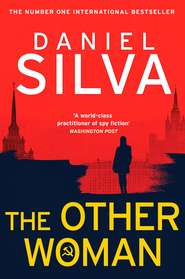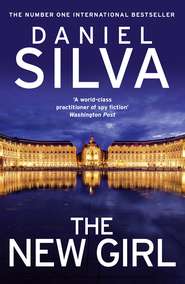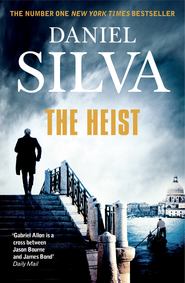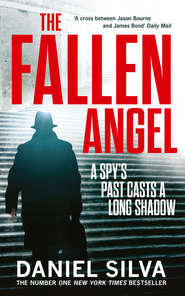По всем вопросам обращайтесь на: info@litportal.ru
(©) 2003-2024.
✖
The Black Widow
Настройки чтения
Размер шрифта
Высота строк
Поля
“He’s entering the lobby. He has two friends, both armed.”
Mikhail killed the call and remained seated for an additional ten minutes. Then, gun in hand, he moved to the entrance hall and placed his ear against the door. Hearing nothing outside, he returned the gun to the small of his back and stepped into the corridor, which was deserted except for a single male member of the housekeeping staff. Upstairs, the roof bar was the usual scene—rich Lebanese, Emiratis in their flowing white kanduras, Chinese businessmen flushed with drink, drug dealers, whores, gamblers, adventure seekers, fools. The sea wind toyed with the hair of the women and made wavelets in the pool. The throbbing music, spun by a professional DJ, was a sonic crime against humanity.
Mikhail made his way to the farthest corner of the rooftop, where Clovis Mansour, scion of the Mansour antiquities-dealing dynasty, sat alone on a white couch facing the Mediterranean. He was posed as if for a magazine shoot, with a glass of champagne in one hand and a cigarette smoldering in the other. He wore a dark Italian suit and a white open-neck shirt that was handmade for him by his man in London. His gold wristwatch was the size of a sundial. His cologne hung around him like a cloak.
“You’re late, habibi,” he said as Mikhail lowered himself onto the couch opposite. “I was about to leave.”
“No, you weren’t.”
Mikhail surveyed the interior of the bar. Mansour’s two bodyguards were picking at a bowl of pistachios at an adjacent table. The man from the elevator was leaning against the balustrade. He was pretending to admire the view of the sea while holding a mobile phone to his ear.
“Know him?” asked Mikhail.
“Never seen him before. Drink?”
“No, thanks.”
“It’s better if you drink.”
Mansour flagged down a passing waiter and ordered a second glass of champagne. Mikhail drew a buff-colored envelope from his coat pocket and placed it on the low table.
“What’s that?” asked Mansour.
“A token of our esteem.”
“Money?”
Mikhail nodded.
“I don’t work for you because I need the money, habibi. After all, I have plenty of money. I work for you because I want to stay in business.”
“My superiors prefer it if money changes hands.”
“Your superiors are cheap blackmailers.”
“I’d look inside the envelope before calling them cheap.”
Mansour did. He raised an eyebrow and slipped the envelope into the breast pocket of his suit jacket.
“What have you got for me, Clovis?”
“Paris,” said the antiquities dealer.
“What about Paris?”
“I know who did it.”
“How?”
“I can’t say for certain,” said Mansour, “but it’s possible I helped him pay for it.”
4 (#ulink_e353a5f6-aa0f-5017-b785-a83abaa354d2)
BEIRUT—TEL AVIV (#ulink_e353a5f6-aa0f-5017-b785-a83abaa354d2)
IT WAS HALF PAST TWO in the morning by the time Mikhail finally returned to his room. He saw no evidence to suggest it had been disturbed in his absence; even the little foiled chocolate lay at precisely the same angle atop his pillow. After sniffing it for traces of arsenic, he nibbled at a corner thoughtfully. Then, in an uncharacteristic fit of nerves, he hauled every piece of furniture that wasn’t bolted down into the entrance hall and piled it against the door. His barricade complete, he opened the curtains and the blackout shade and searched for his bolt-hole among the shipping lights in the Mediterranean. Instantly, he reproached himself for entertaining such a thought. The escape hatch was to be utilized only in cases of extreme emergency. Possession of a piece of intelligence did not fall into that category, even if the piece of intelligence had the potential to prevent another catastrophe like Paris.
They call him Saladin …
Mikhail stretched out on the bed, his back propped against the headboard, the gun at his side, and stared at the shadowy mass of his fortifications. It was, he thought, a truly undignified sight. He switched on the television and surfed the airwaves of a Middle East gone mad until boredom drove him toward the doorstep of sleep. To keep himself alert he guzzled a cola from the fridge bar and thought about a woman he had foolishly let slip through his fingers. She was a beautiful American of flawless Protestant pedigree who had worked for the CIA and, occasionally, for the Office. She was living in New York now, where she oversaw a special collection of paintings at the Museum of Modern Art. He’d heard she was seeing a man quite seriously, a bond trader, of all things. He contemplated calling her, just to hear the sound of her voice, but decided it would be unwise. Like Russia, she was lost to him.
What’s his real name, Clovis?
I’m not sure he ever had one.
Where’s he from?
He might have been from Iraq once, but now he’s a son of the caliphate …
Finally, the sky beyond Mikhail’s window turned blue-black with the coming dawn. He put his room in order and thirty minutes later slumped bleary-eyed into the back of Sami Haddad’s car.
“How did it go?” asked the Lebanese.
“Total waste of time,” replied Mikhail through an elaborate yawn.
“Where now?”
“Tel Aviv.”
“It’s not such an easy drive, my friend.”
“Then perhaps you should take me to the airport instead.”
His flight was at half past eight. He sailed through passport control as a smiling, somewhat drowsy Canadian and settled into his first-class seat aboard a Middle East Airlines jet bound for Rome. To shield himself from his neighbor, a Turkish salesman of disreputable appearance, he pretended to read the morning papers. In reality, he was considering all the possible reasons why an aircraft operated by the government of Lebanon might fail to reach its destination safely. For once, he thought glumly, his death would have consequences, for the intelligence would die with him.
How much money are we talking about, Clovis?
Four million, maybe five.
Which is it?
Closer to five …
The plane landed in Rome without incident, though it took Mikhail the better part of two hours to clear the organized stampede that was Fiumicino’s passport control. His stay in Italy was brief, long enough for him to switch identities and board another airplane, an El Al flight bound for Tel Aviv. An Office car waited at Ben Gurion; it whisked him north to King Saul Boulevard. The building at the western end of the street was, like Paul Rousseau’s outpost on the rue de Grenelle, a lie in plain sight. No emblem hung over its entrance, no brass lettering proclaimed the identity of its occupant. In fact, there was nothing at all to suggest it was the headquarters of one of the world’s most feared and respected intelligence services. A closer inspection of the structure, however, would have revealed the existence of a building within a building, one with its own power supply, its own water and sewer lines, and its own secure communications system. Employees carried two keys. One opened an unmarked door in the lobby; the other operated the lift. Those who committed the unpardonable sin of losing one or both of their keys were banished to the Judean Wilderness, never to be seen or heard from again.
Like most field agents, Mikhail entered the building through the underground parking garage and then made his way upward to the executive floor. Because the hour was late—the security cameras recorded the time as half past nine—the corridor was as quiet as a school that had been emptied of children. From the half-open door at the end of the hall stretched a slender rhombus of light. Mikhail knocked softly and, hearing no reply, entered. Stuffed into an executive leather chair behind a desk of smoked glass was Uzi Navot, the soon-to-be former chief of the Office. He was frowning at an open file as though it were a bill he could not afford to pay. At his elbow was an open box of Viennese butter cookies. Only two remained, not a good sign.
At length, Navot looked up and with a dismissive movement of his hand instructed Mikhail to sit. He wore a striped dress shirt that had been cut for a thinner man and a pair of the rimless spectacles beloved by German intellectuals and Swiss bankers. His hair, once strawberry blond, was gray stubble; his blue eyes were bloodshot. He rolled up his shirtsleeves, exposing his massive forearms, and contemplated Mikhail for a long moment with thinly veiled hostility. It wasn’t the reception Mikhail had expected, but then one never knew quite what to expect when one encountered Uzi Navot these days. There were rumors his successor intended to keep him on in some capacity—blasphemy in a service that regarded regular turnover at the top almost as a matter of religious doctrine—but officially his future was unclear.











